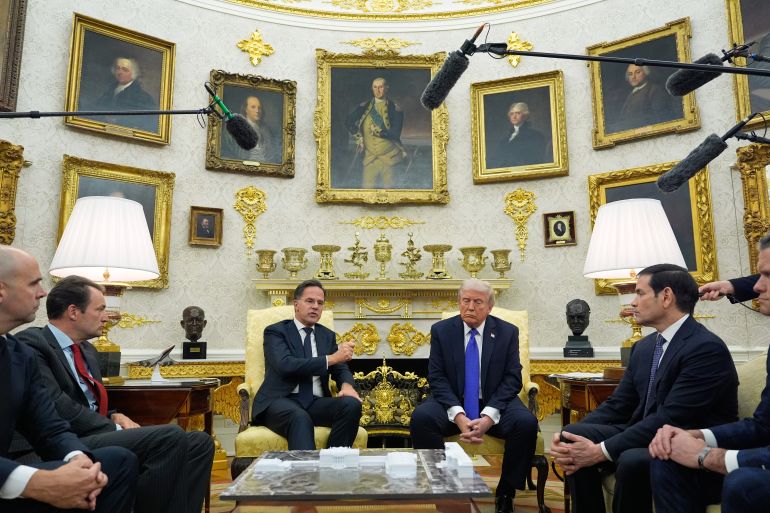Will Trump’s sanctions against Russian oil giants hurt Putin?
US measures against Rosneft and Lukoil will hurt Russia – but probably not enough to stop Ukraine war. Here’s why.

Published On 23 Oct 202523 Oct 2025
Save
Washington has announced new sanctions against Russia’s two largest oil companies, Rosneft and Lukoil, in an effort to pressure Moscow to agree to a peace deal in Ukraine. This marks the first time the current Trump administration has imposed direct sanctions on Russia.
Speaking alongside Nato Secretary-General Mark Rutte in the Oval Office on Wednesday, US President Donald Trump said he hoped the sanctions would not need to be in place for long, but expressed growing frustration with stalled truce negotiations.
Recommended Stories
list of 4 itemsend of list
“Every time I speak to Vladimir [Putin], I have good conversations and then they don’t go anywhere. They just don’t go anywhere,” Trump said, shortly after a planned in-person meeting with his Russian counterpart, Vladimir Putin, in Budapest was cancelled.
Trump’s move is designed to cut off vital oil revenues, which help fund Russia’s ongoing war efforts. Earlier on Wednesday, Russia unleashed a new bombardment on Ukraine’s capital, Kyiv, killing at least seven people, including children.
US Treasury Secretary Scott Bessent said the new sanctions were necessary because of “Putin’s refusal to end this senseless war”. He said that Rosneft and Lukoil fund the Kremlin’s “war machine”.

How have Rosneft and Lukoil been sanctioned?
The new measures will freeze assets owned by Rosneft and Lukoil in the US, and bar US entities from engaging in business with them. Thirty subsidiaries owned by Rosneft and Lukoil have also been sanctioned.
Advertisement
Rosneft, which is controlled by the Kremlin, is Russia’s second-largest company in terms of revenue, behind natural gas giant Gazprom. Lukoil is Russia’s third-largest company and its biggest non-state enterprise.
Between them, the two groups export 3.1 million barrels of oil per day, or 70 percent of Russia’s overseas crude oil sales. Rosneft alone is responsible for nearly half of Russia’s oil production, which in all makes up 6 percent of global output.
In recent years, both companies have been hit by rolling European sanctions and reduced oil prices. In September, Rosneft reported a 68 percent year-on-year drop in net income for the first half of 2025. Lukoil posted an almost 27 percent fall in profits for 2024.
Meanwhile, last week, the United Kingdom unveiled sanctions on the two oil majors. Elsewhere, the European Union looks set to announce its 19th package of penalties on Moscow later today, including a ban on imports of Russian liquefied natural gas.
How much impact will these sanctions have?
In 2022, Russian oil groups (including Rosneft and Lukoil) were able to offset some of the effects of sanctions by pivoting exports from Europe to Asia, and also using a “shadow fleet” of hard-to-detect tankers with no ties to Western financial or insurance groups.
China and India quickly replaced the EU as Russia’s biggest oil consumers. Last year, China imported a record 109 million tonnes of Russian crude, representing almost 20 percent of its total energy imports. India imported 88 million tonnes of Russian oil in 2024.
In both cases, these are orders of magnitude higher than before 2022, when Western countries started to tighten their sanctions regime on Russia. At the end of 2021, China imported roughly 79.6 million tonnes of Russian crude. India imported just 0.42 million tonnes.
Trump has repeatedly urged Beijing and New Delhi to halt Russian energy purchases. In August, he levied an additional 25 percent trade tariff on India because of its continued purchase of discounted Russian oil. He has so far demurred from a similar move against China.
However, Trump’s new sanctions are likely to place pressure on foreign financial groups which do business with Rosneft and Lukoil, including the banking intermediaries which facilitate sales of Russian oil in China and India.
“Engaging in certain transactions involving the persons designated today may risk the imposition of secondary sanctions on participating foreign financial institutions,” the US Treasury Department’s press release on Wednesday’s sanctions says.
Advertisement
As a result, the new restrictions may force buyers to shift to alternative suppliers or pay higher prices. Though India and China may not be the direct targets of these latest restrictions, their oil supply chains and trading costs are likely to come under increased pressure.
“The big thing here is the secondary sanctions,” Felipe Pohlmann Gonzaga, a Switzerland-based commodity trader, told Al Jazeera. “Any bank that facilitates Russian oil sales and with exposure to the US financial system could be subject.”
However, he added, “I don’t think this will be the driver in ending the war, as Russia will continue selling oil. There are always people out there willing to take the risk to beat sanctions.
“These latest restrictions will make Chinese and Indian players more reluctant to buy Russian oil – many won’t want to lose access to the American financial system. [But] it won’t stop it completely.”
According to Bloomberg, several senior refinery executives in India – who asked not to be named due to the sensitivity of the issue – said the restrictions would make it impossible for oil purchases to continue.
On Wednesday, Trump said that he would raise concerns about China’s continued purchases of Russian oil during his talk with President Xi Jinping at the 2025 Asia-Pacific Economic Cooperation summit in South Korea next week.

Have oil prices been affected?
Oil prices rallied after Trump announced US sanctions. Brent – the international crude oil benchmark – rose nearly 4 percent to $65 a barrel on Thursday. The US Benchmark, West Texas Intermediate, jumped more than 5 percent to nearly $60 per barrel.
Pohlmann Gonzaga, however, predicted that the “market will correct from this 5 percent over-jump. You have to recall that sentiment in energy markets is still negative due to the gloomy [global] economic backdrop.”

